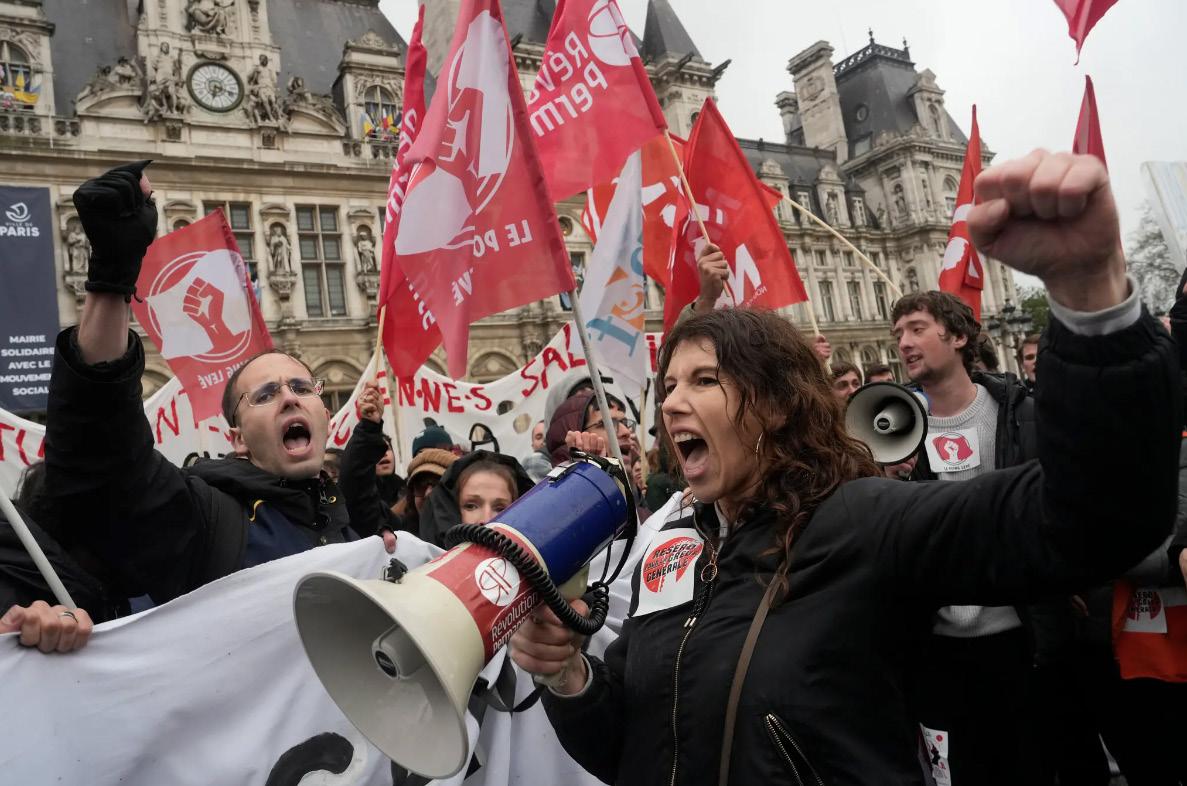
2 minute read
Core of Macron’s pension plan clears key legal test as protesters fume
By AURELIEN BREEDEN
President Emmanuel Macron’s decision to increase the legal retirement age in France was approved by the country’s Constitutional Council late last week, clearing the way for the measure to be gradually introduced in the fall but doing little to quell the seething popular anger against it.
Advertisement
In a highly anticipated ruling, the council, which reviews legislation to ensure it conforms to the constitution, struck down parts of Macron’s pension overhaul, but upheld its core — raising the age when workers can start collecting a government pension, albeit not a full one, to 64, from 62.
“The text has reached the end of its democratic process,” Prime Minister Élisabeth Borne said on Twitter after the ruling. “Tonight, there is no winner and no loser.”
Most opponents of the law had not argued that raising the pension age was itself unconstitutional; instead, they accused the government of misusing legal tools to cut debates short and ram the changes through Parliament, mainly by putting the pension changes into a social security budget bill.
Those tools were designed to avoid end-of-year funding gaps, not to pass hugely consequential social laws, critics argued.
But the council disagreed, saying in a statement that while “the combined use” of those tools was “unusual,” it was not unconstitutional.
The ruling will come as a relief to Macron after months of protests and strikes that had turned into a bitter stalemate with the labor unions that vehemently oppose the law.
He has staked much of his second-term legacy on raising the retirement age, despite its widespread unpopularity, and he will now be eager to put the matter behind him.
But few expect the council’s decision to put a definitive end to the intense political and social turmoil that the pension overhaul kindled, especially since Macron decided to bypass a full vote to get it through Parliament, triggering a no-confidence vote that his Cabinet barely survived.
For labor unions, most opposition parties and many French people, the retirement age increase — constitutional or not — is simply unacceptable, and many have vowed to continue challenging it.
Jean-Luc Mélenchon, a prominent leftist politician, said on Twitter that the ruling showed the council was “more attentive to the needs of the presidential monarchy than to those of the sovereign people” — a swipe at Macron, who has struggled to shake off the image of an aloof and out-of-touch leader.
“The struggle continues and must gather its forces,” Mélenchon added.
Marine Le Pen, of the far-right National Rally, said in a statement that enacting the pension changes would “mark the definitive break between the French people and Emmanuel Macron.”
In the ruling, which cannot be appealed, the nine- member council struck down what it said were legislative riders — six measures unrelated to budgetary matters and therefore deemed unfit to feature in a budget bill.
Those included a provision that would force big companies to disclose how many older workers they employ, and another that would have created a special contract intended to reduce unemployment among older workers.
On Friday, Macron invited the labor unions to meet next week, but the unions quickly refused.
In a statement, they lamented that many of the provisions struck down by the council had been added to soften the blow of the age increase, though the government can still put them into a separate bill that would then have to undergo the usual parliamentary process.
“The law is even more unbalanced and violent than before,” Sophie Binet, the head of the Confédération Générale du Travail, France’s second-largest labor union, told reporters in Paris.

The unions urged Macron not to enact the retirement age increase and said that they would not meet with him until after May 1 at the earliest — when they hope to organize widespread Labor Day demonstrations.
The ruling came a day after hundreds of thousands of protesters once again took to the streets to denounce the overhaul. While the size of the demonstrations and the number of workers taking part in strikes had dwindled somewhat, the turnout has still been notable.










